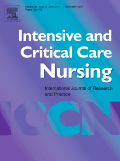
Intensive and Critical Care Nursing
Scope & Guideline
Fostering interdisciplinary dialogue for better outcomes.
Introduction
Aims and Scopes
- Patient-Centered Care and Family Involvement:
Research highlighting the importance of involving patients and their families in care decisions, addressing their needs, and improving communication strategies to enhance overall satisfaction and outcomes. - Delirium and Cognitive Impairment Management:
A consistent focus on understanding, assessing, and managing delirium and cognitive impairment among critically ill patients, emphasizing the need for effective screening and intervention strategies. - Pressure Injury Prevention and Management:
Exploration of risk factors, assessment tools, and interventions aimed at preventing pressure injuries in intensive care patients, reflecting ongoing concerns regarding patient safety and quality of care. - Innovative Nursing Practices and Interventions:
Research on novel nursing strategies and interventions, including the use of technology and evidence-based practices to improve patient outcomes, address workload challenges, and enhance nursing education. - End-of-Life Care and Ethical Considerations:
Discussion of the complexities surrounding end-of-life care in critical settings, including ethical dilemmas, family dynamics, and the role of nurses in facilitating compassionate care. - Workforce Well-Being and Professional Development:
Focus on the mental health and well-being of nursing staff, addressing issues such as burnout, job satisfaction, and the impact of working conditions on the quality of care.
Trending and Emerging
- Mental Health and Well-Being of Healthcare Workers:
An increasing focus on the psychological well-being of nurses and healthcare professionals, particularly in light of the COVID-19 pandemic, addressing burnout, stress management, and resilience. - Use of Technology and Telehealth:
Emerging research on the integration of technology in critical care, including telehealth solutions and digital health tools, to enhance patient monitoring and care delivery. - Personalized and Holistic Patient Care:
A growing emphasis on personalized care approaches that consider individual patient preferences, cultural backgrounds, and holistic treatment strategies. - Rehabilitation and Recovery Post-ICU:
Research on rehabilitation strategies for patients recovering from critical illness is gaining traction, focusing on long-term outcomes and quality of life improvements. - Interprofessional Collaboration and Communication:
Increased attention to the importance of teamwork and communication among multidisciplinary teams in critical care settings, aimed at improving patient outcomes and care efficiency. - Innovative Pain Management Strategies:
Emerging studies on non-pharmacological and alternative pain management strategies, reflecting a broader understanding of pain in critically ill patients and the need for individualized care.
Declining or Waning
- Traditional Infection Control Practices:
Research related to conventional infection control practices seems to be less frequently addressed, possibly due to the emergence of more innovative strategies and technologies that are being prioritized. - Basic Nursing Skills Training:
There appears to be a decrease in studies focusing on basic nursing skills training, as the field shifts towards more complex, advanced practice and specialized interventions in critical care. - Generalized Patient Safety Initiatives:
While patient safety remains a priority, there is a noted decline in publications centered on general safety protocols in favor of more specific issues such as pressure injury prevention and delirium management. - Static Models of Care:
The exploration of static or traditional models of care delivery is less prevalent, with a shift towards dynamic, flexible approaches that adapt to the complexities of individual patient needs. - Pharmacological Interventions:
Research on standard pharmacological interventions is seeing a decline as more emphasis is placed on holistic and interdisciplinary approaches to patient care.
Similar Journals

Pielegniarstwo XXI Wieku-Nursing in the 21 Century
Championing open access to nursing advancements.Pielegniarstwo XXI Wieku - Nursing in the 21 Century is an open-access journal dedicated to advancing the field of nursing research and practice. Published by DE GRUYTER POLAND SP Z O O, this journal provides a platform for innovative studies and discussions focused on contemporary nursing challenges and developments. Launched to further dialogue in nursing and health care, the journal has been freely accessible since 2016, reflecting the growing commitment to share knowledge without barriers. With an ISSN of 1730-1912 and E-ISSN 2450-646X, it serves a global audience of researchers, professionals, and students seeking to contribute to and learn from the latest findings in nursing. Despite its current Scopus ranking in the 10th percentile within the miscellaneous nursing category, the journal remains essential for fostering collaboration and improving nursing education in Poland and beyond. As part of its evolving scope from 2019 through 2024, Pielegniarstwo XXI Wieku aims to enhance the quality of care through evidence-based research and innovative nursing practices.

Revista de Pesquisa-Cuidado e Fundamental Online
Innovating patient care with open access research.Revista de Pesquisa-Cuidado e Fundamental Online, published by the Universidade Federal do Estado do Rio de Janeiro, is a prominent journal dedicated to advancing knowledge and practice in the field of nursing and healthcare. With its Open Access model since 2009, this journal provides an invaluable platform for researchers, professionals, and students to share innovative findings and insights that address critical issues in patient care and nursing education. Though its specific impact factor is not listed, the journal's commitment to open access fosters greater visibility and accessibility of research, ensuring that vital information reaches a wide audience. The journal aims to enhance the quality of care and to support the ongoing development of nursing as a scientific discipline. Located in Rio de Janeiro, Brazil, the journal also reflects regional health paradigms while contributing to global discourse in healthcare research.
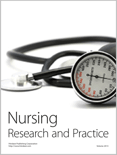
Nursing Research and Practice
Shaping the future of nursing through dedicated research.Nursing Research and Practice, an esteemed open-access journal published by HINDAWI LTD, serves as a vital resource in the field of nursing, providing a platform for the dissemination of innovative research and practice methodologies. With its ISSN 2090-1429 and E-ISSN 2090-1437, this journal has maintained a commendable presence in the academic community since its inception in 2010. Based in Egypt, it is positioned within the Q2 category of Nursing (miscellaneous) and ranks #47/139 in General Nursing according to Scopus, placing it in the 66th percentile. The journal is committed to advancing nursing science and facilitating an evidence-based approach to practice, encouraging contributions that explore the full spectrum of nursing discipline. As a vital reference for researchers, healthcare professionals, and students alike, Nursing Research and Practice not only keeps its audience informed but also promotes innovative practices to enhance patient care across diverse settings.

Australian Journal of Advanced Nursing
Advancing Nursing Knowledge for a Healthier TomorrowThe Australian Journal of Advanced Nursing, published by the Australian Nursing Federation, has established itself as a vital resource in the fields of nursing and advanced nursing practice since its inception in 1983. With an ISSN of 0813-0531 and an E-ISSN of 1447-4328, this peer-reviewed journal aims to disseminate high-quality research, innovative practices, and critical reviews that contribute to the advancement of nursing knowledge and education. With a commendable impact factor and currently positioned in the Q2 quartile in both Advanced and Specialized Nursing and miscellaneous Nursing categories as of 2023, the journal is ranked among the top publications in the field, reflecting its significance and influence in shaping nursing practices and policies in Australia and beyond. The journal provides open access options for a wider readership while specializing in progressive topics that address contemporary challenges in nursing, thus serving researchers, practitioners, and educators alike. It continues to be a cornerstone for advancing the professional development of nursing disciplines, supporting a community that thrives on evidence-based practice and interdisciplinary collaboration.
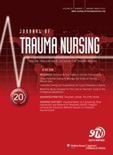
Journal of Trauma Nursing
Exploring the Frontiers of Trauma Nursing ExcellenceJournal of Trauma Nursing, published by LIPPINCOTT WILLIAMS & WILKINS, is a pivotal resource in the fields of trauma, critical care, and emergency nursing. With an ISSN of 1078-7496 and an E-ISSN of 1932-3883, this journal has been at the forefront of disseminating cutting-edge research and innovative practices since its inception in 1995, continuing through 2024. Positioned within the Q3 quartile of the Advanced and Specialized Nursing, Critical Care Nursing, and Emergency Nursing categories, it provides valuable insights into trauma care that enhance clinical practice and patient outcomes. The journal is recognized for its commitment to advancing knowledge and improving the quality of nursing care, making it an essential publication for researchers, practitioners, and students who are dedicated to the fields of trauma and emergency nursing. While currently not available as Open Access, it remains a reputable source of peer-reviewed content aimed at fostering a comprehensive understanding of trauma nursing. Located in the United States at TWO COMMERCE SQ, 2001 MARKET ST, PHILADELPHIA, PA 19103, the Journal of Trauma Nursing continues to impact the profession significantly.
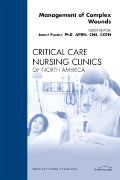
Critical Care Nursing Clinics of North America
Advancing Knowledge for Lifesaving Practices.Critical Care Nursing Clinics of North America, published by W B Saunders Co-Elsevier Inc, stands as a leading journal in the field of critical care nursing, showcasing groundbreaking research and essential clinical practices since its inception in 1989. With an ISSN of 0899-5885 and an E-ISSN of 1558-3481, this quarterly publication has earned its reputation within the Q2 category of critical care nursing, ranking 13th out of 27 in the Scopus metrics. Its contributions significantly aid healthcare professionals in enhancing patient outcomes in critical settings through the dissemination of evidence-based knowledge, innovative approaches, and expert insights. Although it does not offer an Open Access model, the journal remains dedicated to serving researchers, practitioners, and students in understanding advancements and best practices within this dynamic specialty, with a focus on improving the quality of care in critical nursing environments.
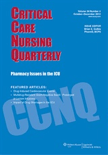
Critical Care Nursing Quarterly
Elevating Critical Care Through Insightful ResearchCritical Care Nursing Quarterly is a distinguished journal published by Lippincott Williams & Wilkins, catering to the vital field of critical care nursing. With an ISSN of 0887-9303 and an E-ISSN of 1550-5111, this journal has been contributing to the advancement of nursing practices since its inception in 1987. Over the years, it has gained recognition, earning a Q3 ranking in Critical Care Nursing for 2023 with a Scopus rank of #9 out of 27, placing it in the 68th percentile of its category. As a non-open access journal, it offers a curated selection of high-quality articles designed to disseminate critical findings, innovative practices, and essential reviews relating to nursing in critical care settings. The journal's ongoing commitment to improving patient care through research and education highlights its pivotal role in shaping the future of critical care nursing. For researchers, professionals, and students alike, Critical Care Nursing Quarterly serves as an indispensable resource in a field that impacts lives daily.
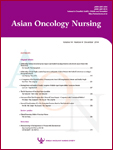
Asian Oncology Nursing
Bridging Research and Practice in Cancer CareAsian Oncology Nursing is a pivotal journal dedicated to advancing the field of oncology nursing across the Asian continent and beyond. Published by the esteemed Korean Oncology Nursing Society, this journal serves as a platform for researchers, clinicians, and educators to disseminate groundbreaking findings and innovative practices in cancer care and nursing. With an ISSN of 2287-2434 and E-ISSN 2093-7776, it is committed to enhancing the knowledge and skills of oncology nursing professionals, thereby improving patient outcomes. Although currently not operating as an open-access platform, the journal emphasizes the significance of bridging the research gap in oncology nursing, fostering collaboration among professionals in the field. Given the increasing importance of culturally competent care in oncology, Asian Oncology Nursing positions itself as an essential resource for those who strive to elevate standards of care and educate future generations of oncology nurses.

CANCER NURSING
Empowering cancer care with evidence-based insights.Cancer Nursing, a peer-reviewed journal published by Lippincott Williams & Wilkins, plays a pivotal role in the field of oncology nursing, providing a vital platform for the dissemination of research that enhances patient care and nursing practices related to cancer. With an impressive impact factor and categorized within the Q2 quartile for both oncology and nursing disciplines, this journal ranks among the top resources in its field, sitting at Rank #5 out of 20 in Nursing Oncology. Since its inception in 1978, the journal has continuously evolved to address critical issues in cancer treatment, patient education, and healthcare delivery, making it essential reading for researchers, practitioners, and students alike. Although it does not currently offer open access, the journal's commitment to advancing knowledge in oncology nursing is reflected in its rigorous selection process and the quality of its published research. As we look towards its upcoming issues in 2024, the journal remains a cornerstone for those dedicated to improving cancer care and the overall quality of life for patients and their families.
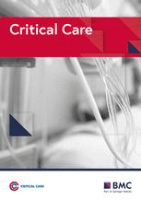
CRITICAL CARE
Empowering healthcare through innovative insights.CRITICAL CARE is an esteemed peer-reviewed journal dedicated to advancing the field of critical care and intensive medicine, published by BMC. Since its inception in 1998, it has been a prominent open-access platform that allows for the dissemination of high-quality research, fostering collaboration among researchers, healthcare professionals, and students globally. With a notable impact factor and ranking in the top quartile (Q1) of critical care and intensive care medicine, CRITICAL CARE occupies a vital role in disseminating cutting-edge findings and innovative practices that can significantly enhance patient outcomes in critical care settings. The journal not only encourages submissions of original research, clinical trials, and reviews but also emphasizes the importance of interdisciplinary approaches to critical care management. Positioned in the United Kingdom, CRITICAL CARE's commitment to open access ensures that its valuable content is readily available to a worldwide audience, reflecting its mission to bridge knowledge gaps and empower professionals in the pursuit of excellence in critical healthcare.